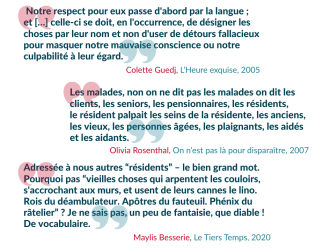
Cathy DISSLER, PhD in French language and literature, is interested in the experience and representations of life in residential care facilities for old people. Her research combines a corpus of literary fiction consisting of 23 realistic novels and stories of filiation, and a corpus of semi-structured interviews conducted with five men and six women in nursing home. She analyzed how older women and men are designated collectively or individually, in institutional contexts and elsewhere.
The interviews revealed that the use of the term “personnes âgées” ("aged person") leads to a form of normative self-correction, for example on the part of Ms. F.: “on dit que la vieill euh que les personnes âgées, ce sont des bibliothèques” This observation, which is undoubtedly unfortunate and unsatisfactory, leads us to believe that no way of referring to them is sufficiently accurate or acceptable.
In contrast, the corpus of literary works reflects the diversity of terms used: “old woman,” “old man,” “guest,” “boarder,” “resident,” “inhabitant,” “grandma,” “grandpa,” etc. Through autonymic modalisation (i.e., the cumulative use of a term and its mention in the utterance), the works oppose fixed discourse, often turning it into derision. What characterizes the novels and stories studied is both a rejection of language injunctions and a rejection of mitigation procedures or euphemisms (“personnes âgées”). In this strategy of naming the old people, Olivia Rosenthal highlights the relationship to the norm (“we say”/" we don't say") and the accumulation of appellations that diffract and reduce identity.
The term chosen to designate a person living in institution implicitly describes, despite itself, the experience that results from it: it is impossible to fully neutralize representations.
Statut : docteure en langue et littérature françaises, attachée temporaire d’enseignement et de recherche
Affiliation :
CIRPaLL (EA7457), Université d’Angers
Pagination
- Previous page
- Page 4